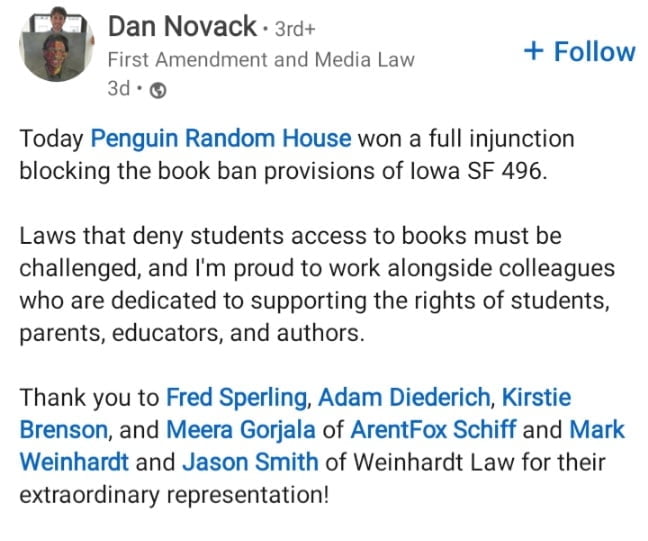During a public hearing on Wednesday, several Iowans voiced their concerns about a contentious state law, Senate File 496, and its accompanying proposed administrative rules. It comes as a judge blocked the book ban law last Friday over its vague wording.
Read: Holocaust memoirs among 450 books removed from Iowa schools
The law, signed by Iowa Republican Governor Kim Reynolds last year, prohibits books with explicit sexual content and discussions of gender identity or sexual orientation in school libraries for children below seventh grade.
Critics argue that the administrative rules fail to clearly define what is banned, leading to an overzealous removal of books from school libraries. Another public hearing is scheduled for Thursday at the Grimes State Office Building in Des Moines.
Judge Locher’s injunction: a blow to overreaching censorship in education
US District Court Judge Stephen Locher, who temporarily blocked the law’s most controversial aspects, described the restrictions as “wildly overbroad,” questioning their compatibility with the First Amendment. Judge Locher’s preliminary injunction halts enforcement of the law, which was set to take effect January 1st, but already had resulted in the removal of hundreds of books from Iowa schools.
Locher had argued in his ruling that the law prohibits discussion of all gender identities, including cisgender male or female, and all sexual orientations, including heterosexuality.
“(O)n its face, the law prohibits any programs, promotion or instruction recognizing that anyone is male or female or in a relationship of any sort (gay or straight),” he wrote. “The statute is therefore content neutral but so wildly overbroad that every school district and elementary school teacher in the state has likely been violating it since the day the school year started.”
“The statute is therefore content neutral but so wildly overbroad that every school district and elementary school teacher in the state has likely been violating it since the day the school year started.”
Judge Stephen Locher
As a result, Locher said, the law could not be applied fairly, as it would be “all but impossible for a reasonable person to know what will and will not lead to punishment.”
Read: Penguin Random House sues Iowa over book bans
More than 450 individual works by more than 300 authors have already been pulled from the shelves of Iowa school districts. Penguin Random House were among the plaintiffs challenging SF 496, and the publisher’s Associate General Counsel Dan Novack hailed the decision, saying: “Laws that deny students access to books must be challenged, and I’m proud to work alongside colleagues who are dedicated to supporting the rights of students, parents, educators, and authors.”

Reynolds and Attorney General Brenna Bird expressed disappointment over the ruling, insisting on the inappropriateness of sexually explicit content and early instruction on gender identity in elementary education.
Balancing protection and censorship
Thomas Mayes, General Counsel for the Department of Education, stated that any actions taken would adhere to current legal constraints. The proposed rules clarify that mere references to sex acts, without explicit descriptions or visual depictions, are permissible. They also limit the scope to school-controlled libraries and stipulate grade-appropriate material access.
Sara Hayden Parris of Annie’s Foundation criticised the rules as “weak and meaningless,” and the legislation was “poorly written” and discriminatory.
“Even with the proposed rules, the law has a staggeringly broad scope, such that the dictionary and Iowa Code are likely prohibited books in Iowa schools.”
Sara Hayden Parris, Annie’s Foundation
She argued that the broad scope of the law could potentially ban a wide range of books, including dictionaries and the Iowa Code itself.
In contrast, Republican House Speaker Pat Grassley defended the law as a protective measure against the sexualisation of children in schools.
Margaret Buckton, representing school advocacy groups, urged for clearer language in the rules to safeguard classic literature from unwarranted removal. She proposed a focus on banning “vivid or pornographic” content rather than vague definitions.
Following the ruling, prominent authors such as James Patterson welcomed the move, saying, “I don’t need somebody outside my family telling my family members what they should and shouldn’t read.”
The final decision on the proposed rules will come after a second round of public comments and a review by the Legislature’s Administrative Rules Review Committee.